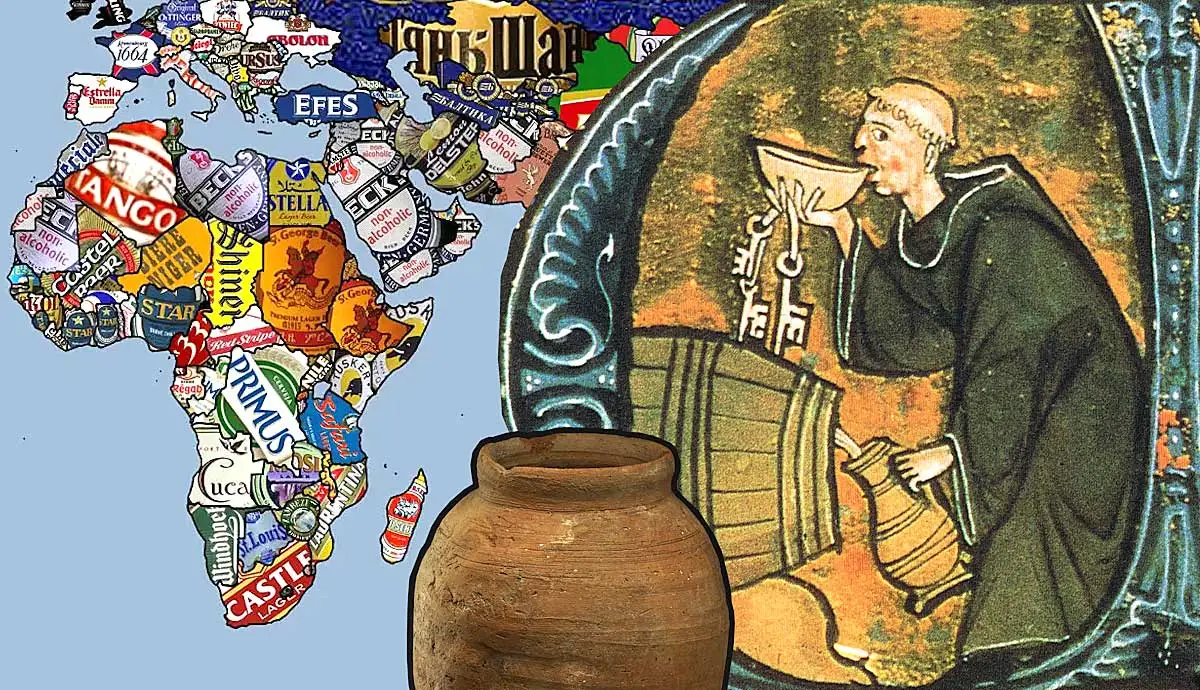The Ancient Origins of Beer
Historians suggest that the first fermentation of beer might have been accidental, occurring in regions where grain was being stored. The grains would have become wet and, left to sit, they began to ferment thanks to wild yeasts in the air. This accidental concoction would have likely been a far cry from the beers we know today, but it was the start of what would become one of the world’s oldest and most beloved beverages.
Excavations of ancient Mesopotamian sites have uncovered evidence that supports the theory of incidental fermentation. Artifacts and writings indicate that these early peoples were brewing a form of beer.
A 6,000-year-old Sumerian tablet depicting people drinking a beverage through reed straws from a communal bowl suggests that beer was already an established part of their culture. This reinforces the idea that beer was not only consumed for enjoyment but also played a significant role in society and ritual.
Further supporting these ancient beer brewing activities are recipes found on cuneiform tablets from Mesopotamia. These recipes, some of the oldest documented formulas in the world, describe a detailed process of brewing beer.
Not merely a haphazard mixing of ingredients, these records show that the Sumerians had a sophisticated understanding of brewing. This includes the use of specific grains and even herbs to create different types of beers, pointing to an early appreciation for the craft of brewing.
Beer in Ancient Egypt
The tradition of brewing beer traveled from Mesopotania to ancient Egypt. The Egyptians refined the brewing process and beer became a daily staple for Ancient Egyptians of all social classes. It was such a vital part of their society that it was even used as a currency. Workers building the great pyramids of Giza were often paid with beer, as it was considered a nutritious and revitalizing beverage.
Egyptian breweries were highly sophisticated for their time. They utilized large-scale production methods that would not be out of place in a modern brewery. The Egyptians also introduced the use of emmer wheat, a type of hulled wheat, which contributed to the distinctive taste of Egyptian beer.
Paintings and inscriptions in tombs from this era depict the brewing process, indicating its importance in Egyptian life and the afterlife.
Moreover, the Egyptians were pioneers in the regulation of beer production. They implemented standards and laws regarding brewing to ensure quality and consistency. This level of control further underscores the significance of beer in ancient Egyptian culture and its development as a craft.
Beer’s Role in Medieval Europe
As beer made its way into Europe, it took on new forms and significance. In medieval times, beer was a safer alternative to often contaminated water and was consumed daily by people of all ages and classes.
The introduction of hops from the 9th century onwards was a revolutionary addition to beer brewing in Europe. Hops not only preserved beer longer but also imparted a bitter flavor that balanced the sweetness of the malts.
The use of hops quickly spread throughout Europe and became a staple ingredient in beer recipes.
Monasteries played a crucial role in the brewing and refinement of beer during this period. Monks were among the era’s most skilled brewers, and they took great care in crafting their beers, which were often used for religious ceremonies and as a source of income for the monastic communities.
The brewing of beer also saw the introduction of various brewing guilds across Europe. These guilds were responsible for maintaining standards and protecting the secrets of the trade. They set regulations that defined everything from the ingredients used to the weights and measures, and even the prices of beer.
Scientific Advancements and Modern Brewing
The industrial revolution brought significant changes to the brewing of beer. The invention of the steam engine allowed for greater production capacities and the introduction of new technologies like refrigeration changed the landscape of brewing by allowing for consistent temperature control during fermentation.
Scientific advancements also played a crucial role. The discovery of yeast’s role in fermentation by Louis Pasteur in the 19th century was perhaps the single most important scientific breakthrough for brewing.
Pasteur’s work not only improved the quality and safety of beer but also allowed brewers to develop more precise techniques for producing different styles of beer.
Today, the brewing industry combines age-old traditions with modern technology. The result is a vast array of beer types and flavors, enjoyed worldwide. With the rise of craft breweries, old styles are being revived, and new styles are being invented, ensuring that the evolution of beer continues.
From its accidental discovery to its status as a craft and a staple, beer has had a profound impact on societies throughout history.
The journey of beer through the ages is not just about a beverage but a reflection of human civilization, innovation, and cultural integration. As we continue to enjoy and innovate within this ancient beverage, we also pay homage to a tradition that has been shared worldwide for thousands of years.
